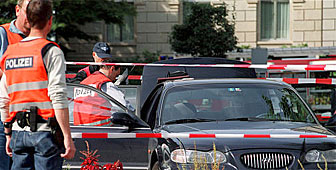Swiss politics faces tighter security in wake of Zug tragedy

Increased security in cantonal parliament buildings across Switzerland and a list of people likely to cause a threat to public safety are two measures that the Swiss authorities have taken in the aftermath of the Zug tragedy.
Less than a month after the September 27 massacre, when a lone gunman ran amok in the cantonal parliament, killing 14 people before turning the gun on himself, Swiss police are busy trying to limit the potential for another massacre.
The first measure to take effect was the presence of guards and policemen outside cantonal parliament buildings, notably in German-speaking Switzerland.
In Zurich, three administrative buildings are now only accessible by four principal entrances, which are guarded by police officers. All other entrances are permanently locked and can only be accessed with a key.
In the Italian-speaking canton of Ticino, a screen has been installed in the main parliament chamber to separate the public from the politicians.
In the capital, Bern, the federal parliament is under heightened security with guards refusing entry to anyone who is acting in a suspicious manner. The personal security of all members of parliament is now under review.
List of people
The second measure is the compilation of a list of people who pose a threat to parliamentarians and their safety.
Three such lists already exist in cantons Lucerne, Vaud and Schwyz. The lists were started shortly after the Zug massacre and Lucerne’s list has already led to two arrests. There are no reports of a federal list.
However, Markus Siegenthaler, the president of the inter-cantonal association for data protection, has raised concerns about the lists. He says the authorities should exercise caution and common sense when it comes to the lists.
According to Siegenthaler, the police should only put people on the list if they have made a threat verbally or by post involving firearms.
Threatening letters
Mark Stucki, a spokesman for the federal parliament, says that an increasing number of letters containing insults or threats have been sent to both federal and local parliaments since the Zug tragedy, but he could not say whether there was a link between the increase and the events of September 27.
The Swiss security forces are taking these threats seriously and any parliamentarian who receives such post can forward the mail to the police for a criminal investigation.
Parliamentary replacements
Meanwhile, two political parties in canton Zug are continuing their efforts to find parliamentary replacements for victims of the September massacre.
The Radical and Christian Democratic Parties lost six and five parliamentary representatives respectively.
In seven cases, the succession is expected to follow previously established rules of accession. The communes affected by the change – six in all – will have to declare the newcomers elected, according to Tino Jorio, of the Cantonal chancery.
The local government will then formally ratify the decision.
Other seats are likely to be filled by tacit agreement, says Jorio. As a result, citizens will not be asked to vote.
The massacre – the worst in Switzerland’s history – sent shock waves through the country, and provoked much debate about the tradition of allowing public access to state buildings.
swissinfo with agencies

In compliance with the JTI standards
More: SWI swissinfo.ch certified by the Journalism Trust Initiative
You can find an overview of ongoing debates with our journalists here. Please join us!
If you want to start a conversation about a topic raised in this article or want to report factual errors, email us at english@swissinfo.ch.